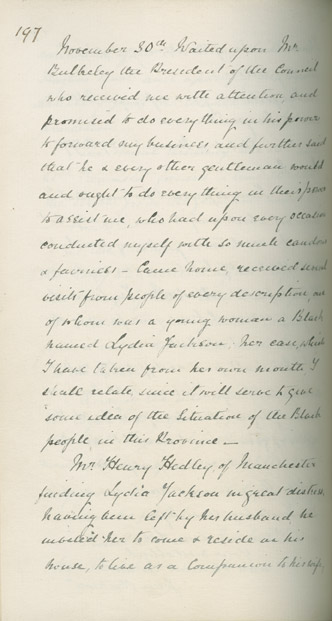Nova Scotia Archives
African Nova Scotians in the Age of Slavery and Abolition
John Clarkson's account of the story of Lydia Jackson
note: transcription publicly contributed - please contact us with comments, errors or omisions
November 30th — Waited upon Mr. Bulkeley the President of the Council who received me with attention and promised to do everything in his power to forward my business and further said that he & every other gentlemen would and ought to do every time in their power to assist me, who had upon every occasion conducted myself with so much candour & fairness — Came home, received several visits from people of every description and of whom was a young woman a Black named Lydia Jackson; her case, which I have taken from her own mouth I shall relate since it will serve to give some idea of the situation of the Black people in this Province.
Mr. Henry Hedley of Manchester finding Lydia Jackson in great distress having been left by her husband, he invited her to come & reside in his house, to live as a companion to his wife,
Lydia Jackson was likely one of two persons named 'Lydia' from South Carolina listed in the Book of Negroes (1783). Clarkson narrates her ordeal in his journal. A free black settler at Manchester (Guysborough County), Jackson was deserted by her husband and became an indentured servant to a Loyalist. He tricked her into agreeing to a much longer term of service and immediately sold her, as if she were a slave, to Dr John David Bolman of Lunenburg. Bolman had been a Hessian regimental surgeon (on the British side during the American War of Independence.) He abused her severely, even while she was in the last month of pregnancy. After three years she escaped to Halifax. Not surprisingly, she was among those who chose to emigrate to Sierra Leone.
Like her more famous contemporary, Rose Fortune, Lydia Jackson has not been forgotten. Her ordeal has been the subject of poetry as well as history. She appears as an icon ("Lydia Jackson, slave madonna") in a 1982 poem expressing rage against slavery, nearly 200 years after Clarkson wrote about her in his journal. (George Elliott Clarke, "Hammonds Plains African Baptist Church" in George Elliott Clarke, ed., Fire on the Water: An Anthology of Black Nova Scotian Writing vol. 2, Pottersfield Press 1992)
Date: 30 November 1791
Reference: John Clarkson Nova Scotia Archives MG 1 volume 219 pages 197-201; published in Clarkson's Mission to America, 1791-1792 page 89-90 (Public Archives of Nova Scotia Publication number 11, 1971) (F90 /N85/ Ar2P number 11) view this publication PDF

